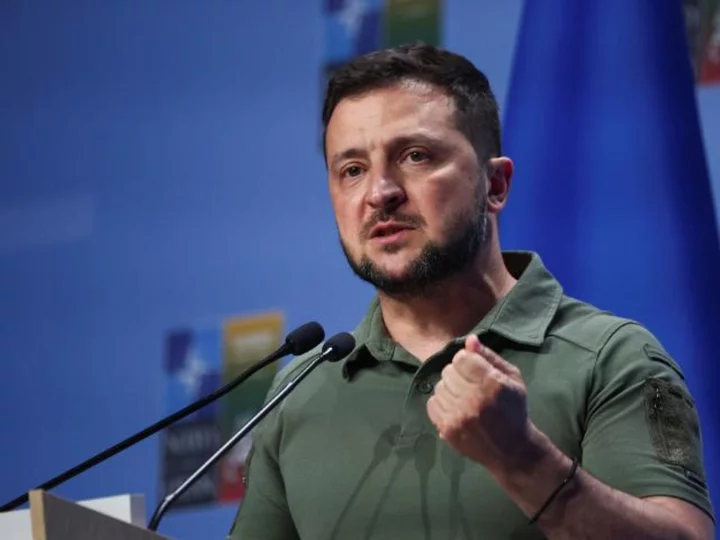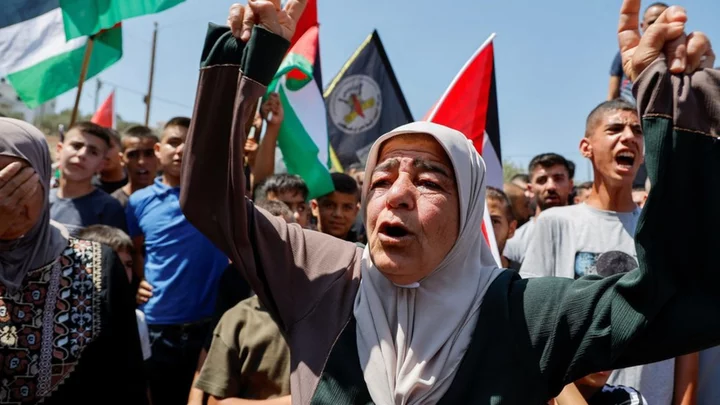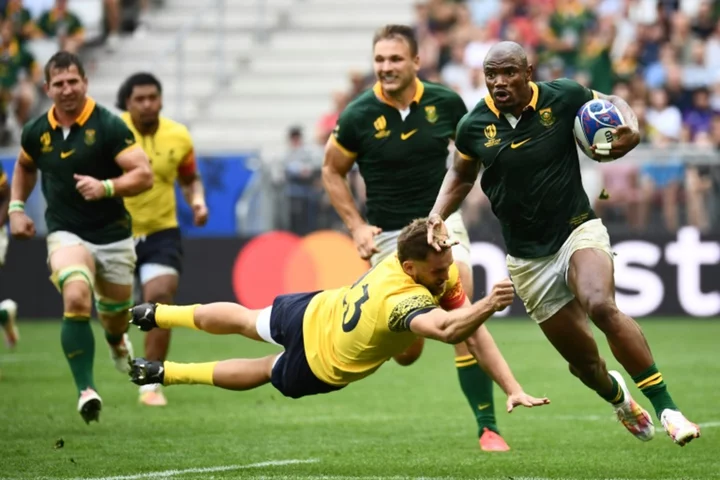One of Ukraine's greatest tragedies as it pursues a critical offensive that has, so far, failed to meet its own and Western expectations is that it cannot, by itself, decide its destiny.
President Volodymyr Zelensky's government is dependent on a massive pipeline of US and western armaments. And Russian President Vladimir Putin, whose historical obsessions and personal power calculations thrust Ukraine into this horrific war, will also have a great say in if and when it ends. So, while battlefield sacrifices will decide how much seized territory Ukraine recovers, the outcome of the war will also be shaped by outside factors, including shifting political forces in the US, Moscow and European capitals.
A stalled offensive and a winter stalemate, for instance, would have particular ramifications in the United States since it could heighten questions over US support for the war that will be pushed into an acrimonious election year. Americans are braced for a potential clash between President Joe Biden, who revived the Western alliance and is Ukraine's most critical outside supporter, and ex-President Donald Trump, a NATO skeptic who admires Putin and has pledged to end the war in 24 hours, likely on Putin's terms. And even if Trump is not the GOP nominee in 2024, ebbing public support for the war could hurt Biden.
Therefore, for political, as well as strategic reasons, there is huge pressure on Ukraine's long-awaited counteroffensive this summer to produce significant battlefield breakthroughs. But so far, the push is more of a slog than a blitzkrieg, raising the possibility that the war could last at least deep into next year. If so, the elastic equation that underpins the entire conflict -- involving Ukraine's capacity to fight, Americans' appetite for multi-billion dollar aid packages and Putin's tolerance for horrendous casualties -- will be even more taut.
A report by CNN's Jim Sciutto Tuesday encapsulated the critical nature of Ukraine's ability to show momentum in influencing the politics of the war in the outside world. Senior US and Western officials spoke of increasingly "sobering" assessments about Ukrainian forces' ability to retake significant territory. One senior western diplomat bleakly said that while the opportunity exists for Ukraine to make progress, it was "extremely, highly unlikely," that it would change the balance of the conflict in the coming weeks. Officials both inside and outside Ukraine now admit advances in the offensive are coming more slowly than they had hoped to see.
Ukraine's struggles -- and heavy combat losses -- stem in part from entrenched, layered defensive positions, trenches and minefields that Russia had months to construct and the battlefield reality that an attacking force needs a numerical advantage over well dug-in troops. While Russia's forces were exposed in their initial invasion and failed charge to Kyiv, the war has now entered a more difficult stage for Ukraine.
Zelensky admits Ukraine is tired but says Russia is fearful
In a sign of the importance of outside perceptions about the Ukrainian war, Zelensky is sensitive to any notion that the counteroffensive has been a disappointment, though characteristically stresses he needs more high-grade western weapons.
"The counteroffensive is difficult. It is happening probably slower than how some people may want or can see it," Zelensky said in a meeting with Latin American media outlets, video of which was released on Tuesday. But calling for patience among allies, he vowed his forces would triumph over demoralized Russians: "There is fatigue in our eyes, but there is fear in their eyes. And these are two very different things."
It's too early to say the Ukrainian offensive is running out of time despite the looming arrival of fall weather that could make major maneuvers more difficult.
Retired Army Lt. Gen. Mark Hertling, for instance, pointed out on CNN Tuesday that "many analysts believed Ukraine could not stop Russia at the beginning of this war," and had been proven wrong by Kyiv's forces. He said Ukraine was waging a vast offensive across an area equivalent to the distance between Washington and Boston and needed time.
"There is a lot of dour commentary about what is going on right now, but what Ukraine is doing is the toughest of all missions and it's going to take a long time," Hertling said.
US political outlook darkens for Ukraine
But does the West have the forbearance to give Ukraine the time it needs? A lack of big breakthroughs against Russia in the coming weeks will give Western policymakers little choice to consider the wider political context of the war, even if there is no end in sight.
Despite a high-level international conference in Saudi Arabia to explore potential peace settlements over the weekend, there is so far no clear path even to a ceasefire. Ukraine has little appetite for yielding, as it seeks a return to its 1991 borders -- an aspiration that would require an expulsion of Russian forces from annexed Crimea, which looks unlikely right now. Putin, after failing in his bid to effectively wipe the nation of Ukraine off the map, is yet to make gains that would allow him to proclaim a version of victory that could be vital to cementing his rule at home. Ultimately, the capacity of both Russia and Ukraine to sustain heavy battlefield losses will be critical in deciding the point at which either side might be open to a settlement -- when the cost of continuing to fight might be outweighed by the rewards of ending it.
The moment when this scenario arrives may have a lot to do with the constancy or long-term fragility of US support, which is vital not just to arming Ukraine but to maintaining NATO unity and European resolve.
Whether or not he wins a second term, Biden's legacy will be dominated by his role in responding to Russia's invasion, in the most significant show of leadership of the West by a US president at least since George H.W. Bush at the end of the Cold War.
Biden is already working on a new supplemental funding bill that will likely be ready for Congress to consider by the end of the year. The measure will be the most important test yet of the House GOP majority's willingness to continue throwing billions of dollars at the war, despite deep skepticism among many Republicans. Any suggestion that Ukraine's offensive has been bogged down will deepen that skepticism over a prolonged US commitment. While foreign policy is rarely a deciding factor in presidential elections and the war in Ukraine is not a dominant issue in the GOP primary, some party supporters in early voting states like Iowa and New Hampshire do raise it and question US generosity after months of high inflation, which, even if it's cooling, has contributed to persistently dour views of the American economy.
A new CNN/SSRS poll last week reflected the political complexities in the US over the war, with 55% of voters now saying Congress should not authorize additional funding to support Ukraine. Some 51% said that the US has already done enough to help, while 48% say it should do more. Soon after the Russian invasion in February 2022, 62% said the US should do more to support Ukraine. Like almost everything else in the US, backing for the war effort is deeply polarized. The CNN poll found 71% of Republicans think that Congress should not authorize new funding while 62% of Democrats say it should. The poll does suggest a sweet spot of sufficient Republican and Democratic support for new funding may exist. But the question is whether House Speaker Kevin McCarthy, who has a tiny majority and only serves as the pleasure of the most pro-Trump Republicans, is willing or able to pass a big aid bill on a bipartisan basis. The political dynamics in the House represent a rather precarious foundation for Ukraine's vital US support, underscoring why a stalled offensive could represent a political disaster for Zelensky in the United States as well as a strategic loss for Ukraine at home.
The White House is downplaying the idea that Ukraine is losing momentum and for now has the luxury of time. John Kirby, the National Security Council's coordinator for strategic communications, told CNN's Wolf Blitzer on Tuesday that Ukraine was making some progress, and hinted that a new assistance package, potentially including mine sweeping equipment and HIMARS artillery sets, could be coming this week.
Still, given ebbing US public support for the war, Biden could face a complicated task in explaining prolonged US support for Ukraine during another bloody summer as he runs for reelection next year. No US troops are fighting in the war, and the president has long opposed US involvement in overseas entanglements. He's made avoiding a direct US clash with Russia a centerpiece of his strategy, but still, Trump sees an opening.
Despite his political vulnerabilities over his genuflecting to Putin, who has been accused of war crimes, the former president has been loudly warning that Biden's stance on Ukraine could lead to World War III and a nuclear conflict. And even if he is not the GOP nominee, Ukraine's most vocal supporters in the Republican field -- including former New Jersey Gov. Chris Christie, who visited Kyiv last week, former South Carolina Gov. Nikki Haley and ex-Vice President Mike Pence -- are at the back of the primary pack.
So when US voters decide their own futures in November 2024, there's a good chance they will be playing a large role in sealing Ukraine's fate as well.









